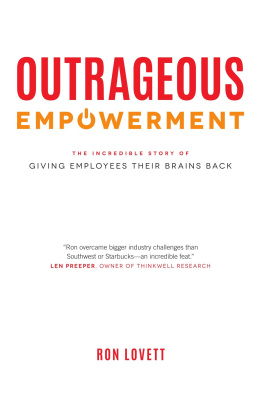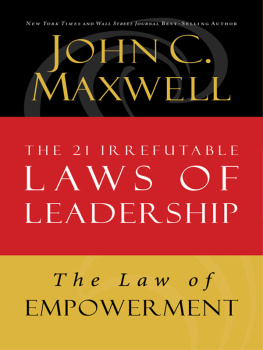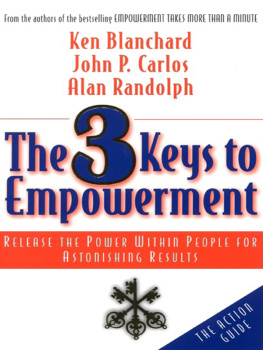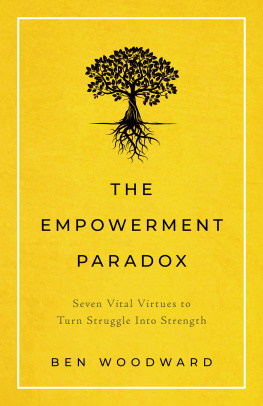Cover
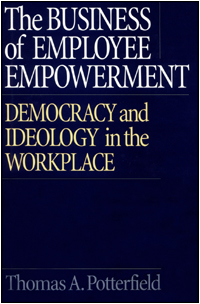
| title | : | The Business of Employee Empowerment : Democracy and Ideology in the Workplace |
| author | : | Potterfield, Thomas A. |
| publisher | : | Greenwood Publishing Group |
| isbn10 | asin | : | 1567202616 |
| print isbn13 | : | 9781567202618 |
| ebook isbn13 | : | 9780585383118 |
| language | : | English |
| subject | Employee empowerment, Industrial management--Employee participation. |
| publication date | : | 1999 |
| lcc | : | HD50.5.P67 1999eb |
| ddc | : | 658.3/14 |
| subject | : | Employee empowerment, Industrial management--Employee participation. |
Page i
The Business of
Employee Empowerment
Page ii
This page intentionally left blank.
Page iii
The Business of
Employee Empowerment
Democracy and Ideology
in the Workplace
THOMAS A. POTTERFIELD

Page iv
Library of Congress Cataloging-in-Publication Data
Potterfield, Thomas A., 1954
The business of employee empowerment : democracy and ideology in
the workplace / Thomas A. Potterfield.
p. cm.
Includes bibliographical references and index.
ISBN 1567202616 (alk. paper)
1. Employee empowerment. 2. Industrial managementEmployee
participation. I. Title.
HD50.5.P67 1999
658.314dc21 9841035
British Library Cataloguing in Publication Data is available.
Copyright 1999 by Thomas A. Potterfield
All rights reserved. No portion of this book may be reproduced, by any process or technique, without the express written consent of the publisher.
Library of Congress Catalog Card Number: 9841035
ISBN: 1567202616
First published in 1999
Quorum Books, 88 Post Road West, Westport, CT 06881
An imprint of Greenwood Publishing Group, Inc.
Printed in the United States of America

The paper used in this book complies with the Permanent Paper Standard issued by the National Information Standards Organization (Z39.481984).
10 9 8 7 6 5 4 3 2 1
Page v
To Kate,
Think deeply, discover what you love,
and never lose sight of the fact that things can be different.
Page vi
This page intentionally left blank.
Page vii
Contents
Acknowledgments | ix |
Introduction | |
1. Social, Political, and Economic Antecedents of Empowerment | |
2. The Theories and Practices of Empowerment | |
3. Ideas in Action: Empowerment at a Fortune 100 Corporation | |
4. Integrating Theory and Practice: Reflections on the Farbrook Technologies Interviews | |
5. The Emancipatory Potential of Empowerment | |
6. Ideological Influences within the Theories and Practices of Empowerment | |
7. Overcoming Ideological Influences and Advancing the Cause of Freedom | |
Appendix: Research Methods | |
References | |
Index | |
Page viii
This page intentionally left blank.
Page ix
Acknowledgments
No one writes a book without being blessed with many sources of support and inspiration. I am no exception. Certainly, I am indebted to the many scholars and theorists whose ideas have informed and inspired nearly every aspect of this work. Their contributions are evident throughout the book. Unfortunately, the limits of time, space, and my own flawed memory prevent me from acknowledging all who have contributed to this work. Some contributions, however, were so important as to require formal mention.
I must thank Donald Rothberg, Tony Stigliano, Richard Snyder, and Walter Nord for providing inspiration, direction, constructive criticism, and kind support. Donald, Tony, and Walter were particularly thoughtful and thorough in their critiques of earlier drafts of this work. Their input improved the final product considerably.
I am especially grateful to Donald, who introduced me to and then guided me through the complex and often difficult literature of critical theory. Donalds balanced notion of critique informs much of my work.
I am also appreciative of the assistance provided by Susan and the workers at Farbrook Technologies. Susan was supportive and honest, and I am in her debt. The workers at Farbrook were generous with their time and honest in their responses. They provided real insight into the practice of empowerment.
I am fortunate to have the direction and support of my editor, Eric Valentine, who guided me through my maiden publishing voyage with humor, patience, and diligence.
My parents, Arthur and Kathleen Potterfield, have inspired me and influenced my work in ways that they probably dont realize. My father understands the role of power in working relationships better than anyone I
Page x
know. I admire his uncompromising support of working people throughout his life. My mother has devoted her life to apparently lost causes without ever giving in to despair or cynicism. Her apparent belief that even the most horrifying and unyielding circumstances can be improved is an inspiration.
Lastly, of course, I must thank my wonderful family, my wife, Donna and daughter, Kate, for their patience, understanding, and support. Its not a lot of laughs living with someone who is writing a book. Donna and Kate tolerated my obsessions, kept me balanced, and were always loving and supportive. They accepted my preoccupations and ruminations with grace. They made it easy.
Page 1
Introduction
During the 1950s and 1960s, a number of prominent management theorists began calling for more democratic and participatory forms of corporate governance. Notably, writers like Chris Argyris (1957), Rensis Likert (1961), and Douglas McGregor (1960) criticized the hierarchical, authoritarian approaches characteristic of traditional corporate management and argued for greater autonomy and increased participation in decisionmaking on the part of corporate employees. A few years later, Warren Bennis (1968) went so far as to argue that the democratic governance of corporations was inevitable. While all of these writers have slightly different reasons supporting their claims, the overall arguments are that (a) the fastpaced, ever changing, chaotic business environment demands creative, flexible, loyal, and highly motivated employees; (b) to attract and motivate these sort of employees, organizations would have to develop more democratic organizational structures that offer employees greater autonomy, freedom, and participation in the decisions that affect their working lives; and (c) the increasingly well-educated citizenry would balk at working within the constraints of the traditional command and control organizations and would demand that the same democratic ideals and practices that are valued in the larger society be evidenced in the workplace.
Next page


